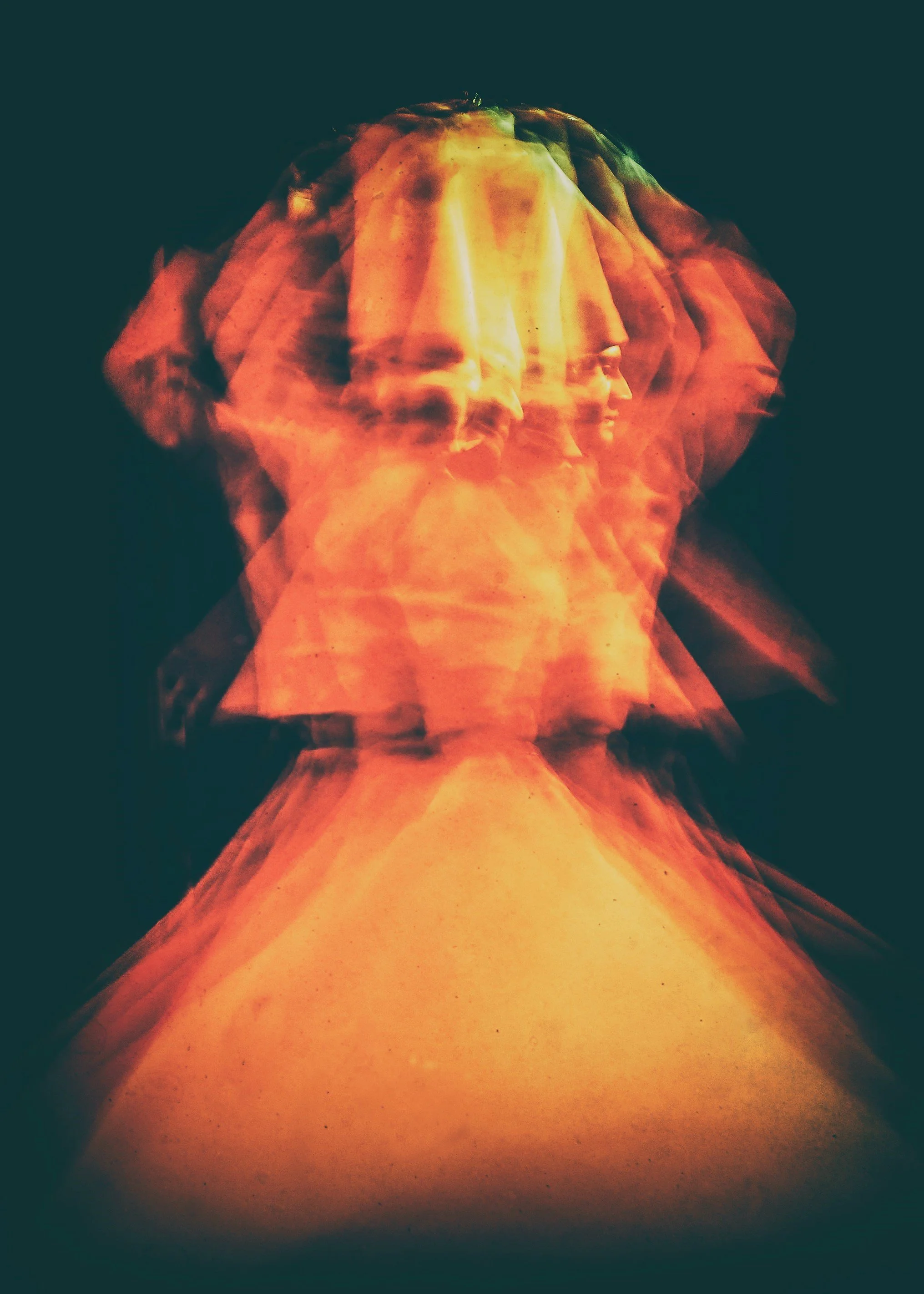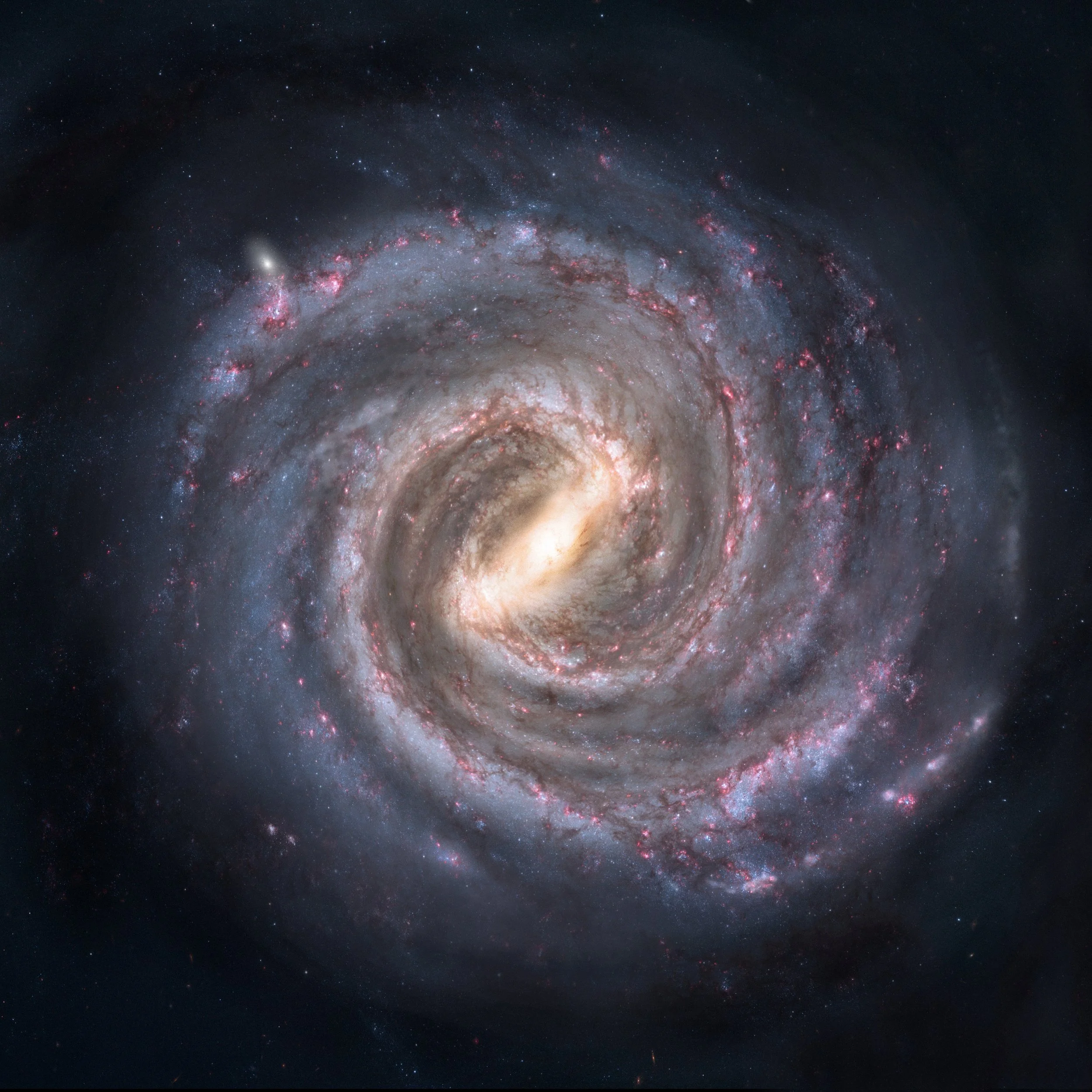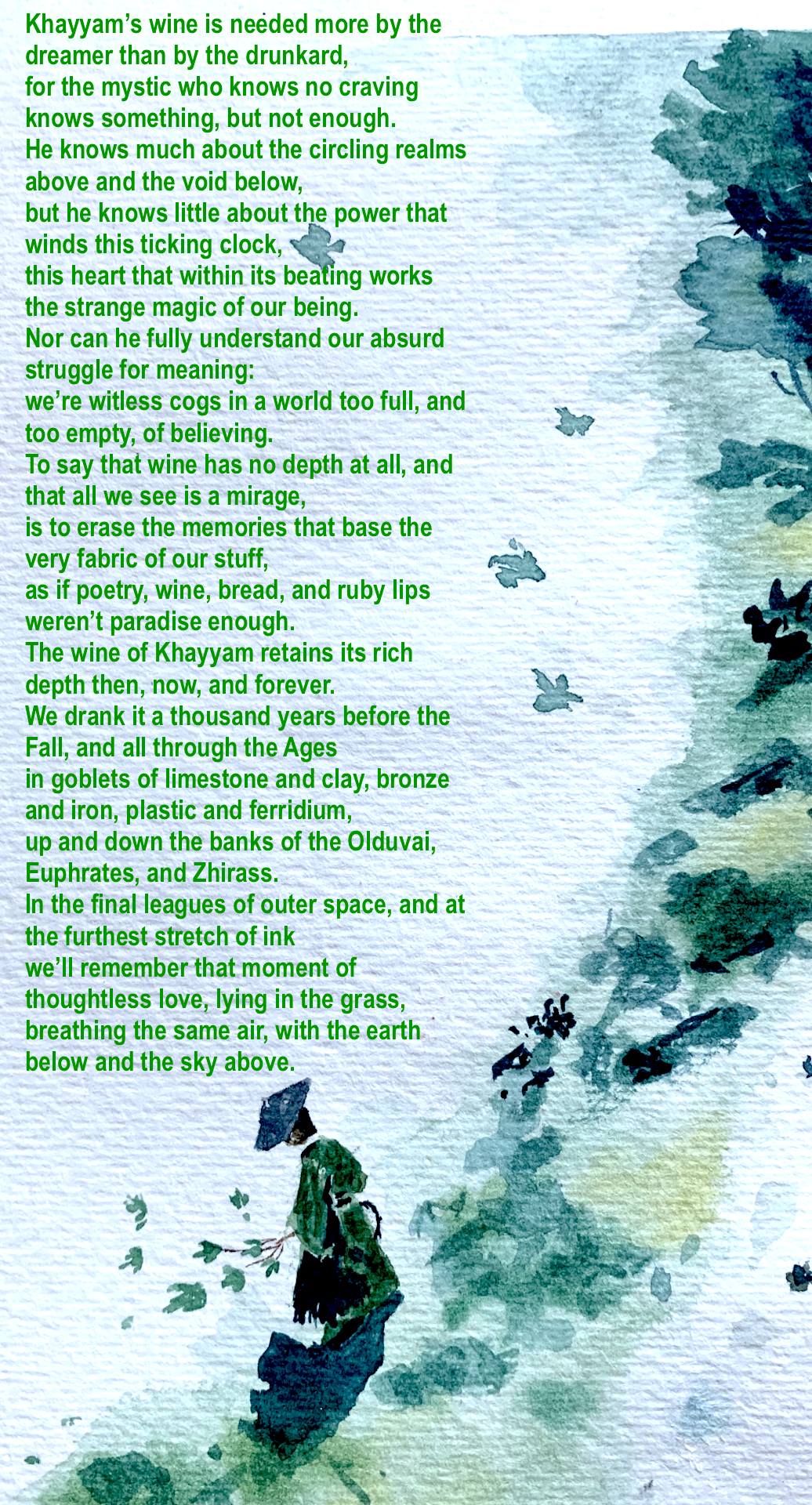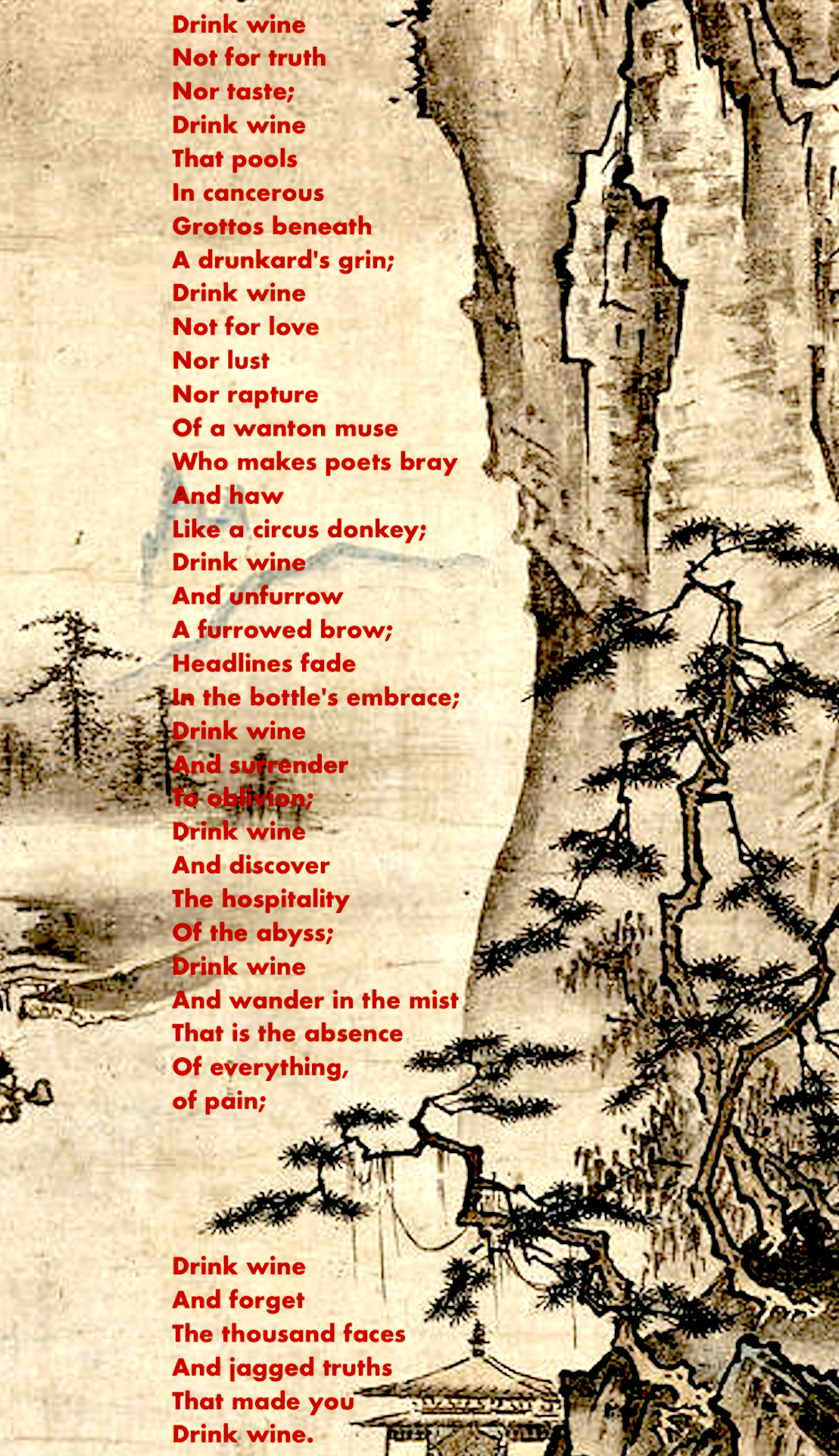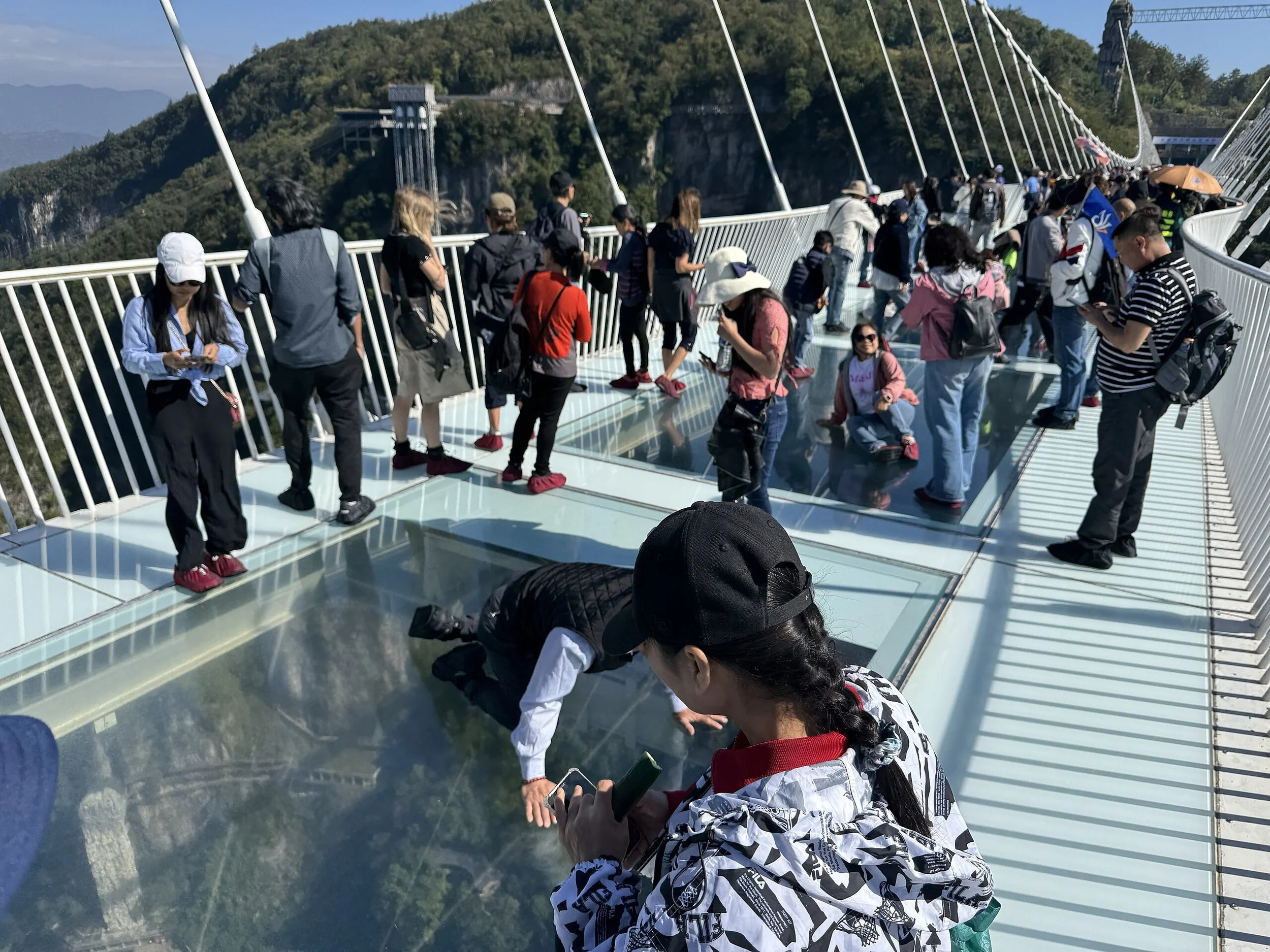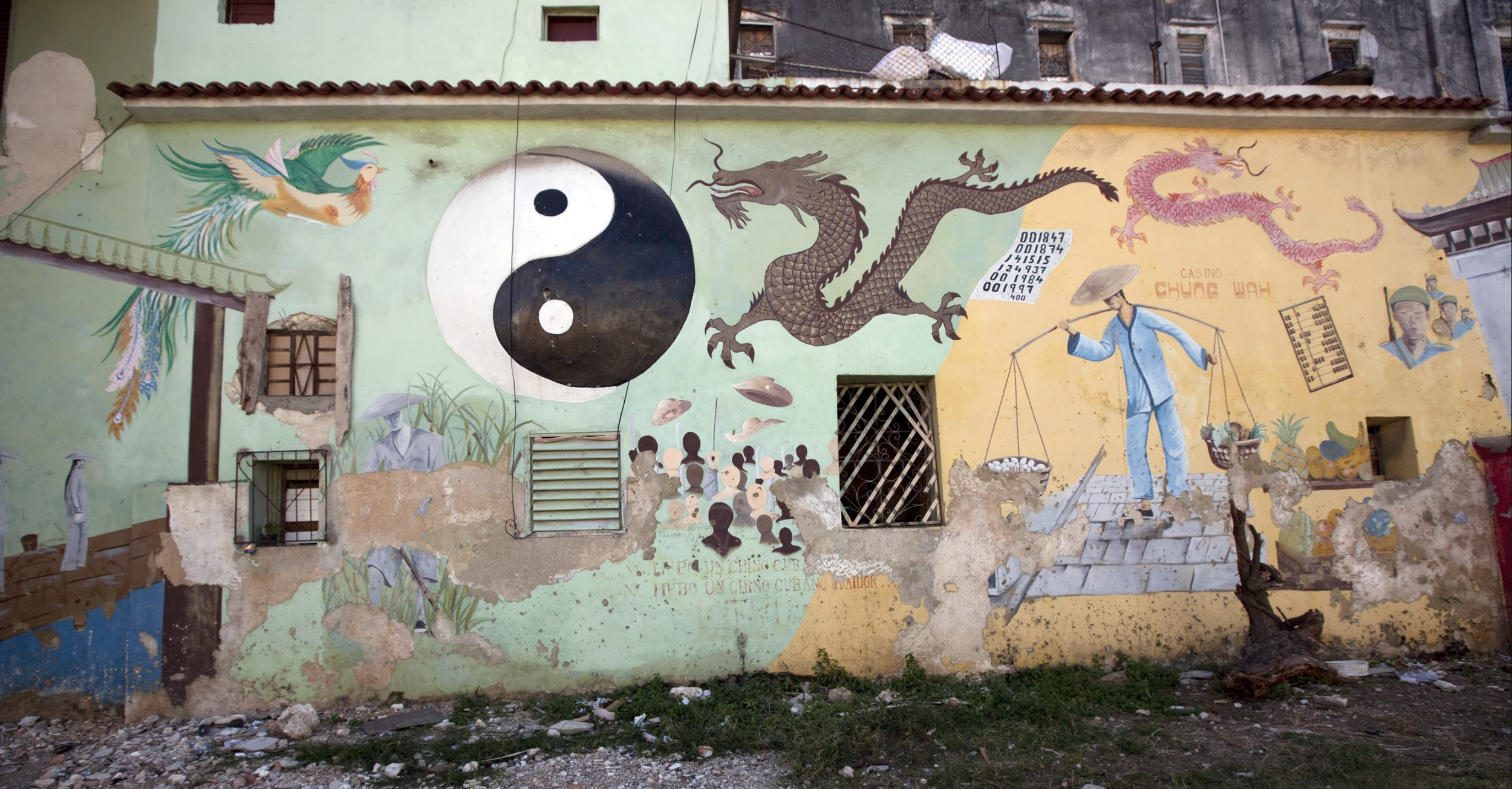The Double Refuge ❇️ Aims & Terms
The Battered Caravanserai
Whirling in Space - The Bread of Angels - Nishapur Wine - Sense & Spirit
❇️
Think, in this batter'd Caravanserai
Whose Doorways are alternate Night and Day,
How Sultán after Sultán with his Pomp
Abode his destin'd Hour, and went his way.
— from the Rubaiyat of Omar Khayyam, most freely translated by Edward Fitzgerald
❇️
Whirling in Space
In The Double Refuge I explore the relation between doubt and belief. I argue that one can help in understanding the other, and also that one can be a refuge for the other: belief can be a refuge from existential alienation, and doubt can be a refuge from spiritual dogma. As the Persian poet Omar Khayyam said 900 years ago, the world’s a rough and dizzying place, a “battered Caravanserai / Whose Doorways are alternate Night and Day.” To live in this world, it helps to be flexible, one moment measuring it like an astronomer, the next moment rotating with it, like a dervish among the spinning atoms and stars.
A hundred years after Khayyam, another Persian poet, Jalāl al-Dīn Muḥammad Rūmī, inaugurated the Mevlevi Order, the sect of Sufi mystics who dedicate themselves to union with God, to spinning the atoms of their being until they spin with the atoms of the infinite cosmos.
Rumi wrote stories and love poems, and often used wine and drunkenness to symbolize spiritual intoxication. The temple becomes a place of prayer, where people call up to Heaven, while the tavern becomes the place of communion, a sort of Heaven on Earth. Coleman Barks renders one of Rumi’s poems in the following manner:
We have a huge barrel of wine, but no cups.
That’s fine with us. Every morning
we glow and in the evening we glow again.
— from “The Tavern: Whoever Brought Me Here Will Have to Take Me Home” in The Essential Rumi
The reason I wrote that Barks renders instead of translates is that he reworks Rumi not from the original Persian, but from other people’s translations. Like Edward Fitzgerald over a hundred years before him, Barks is sometimes criticized for his inaccurate translations. (I should note here that Fitzgerald called his translations transmogrifications; although he used the original Persian, he took enormous liberties.) Personally, I’m not very concerned about literary authenticity, despite having been trained for a decade in literary criticism, and despite having turned my Ph.D thesis into a book (Stranger Gods, 2001). To me, literary expression matters more than literary rules. Writers steal and recreate all the time; just look at Shakespeare. If translators aim toward one thing and yet hit something slightly different, we can acknowledge their shortcomings and yet still appreciate what they found in the end.
When Barks writes, A secret turning in us / makes the universe turn. / Head unaware of feet, / and feet head. Neither cares. / They keep turning, I’m less concerned with the accuracy of the poem’s translation than with the skill by which the English language is used to articulate the ideas. It’s of course interesting to know what Persian translators think of the translation, just as it’s interesting to read Omar Ali-Shah’s critique of Fitzgerald’s Rubaiyat alongside Shah’s own version of it. Yet by and large I don’t delve into these matters. I’d rather focus on the ideas and on the literary qualities. For instance, regarding Bark’s translation, I’d suggest Head unaware of feet, / and feet of head, rather than Head unaware of feet, / and feet head. It just seems easier to process.
In the following translation of Rumi I’m less interested in the fidelity to Persian than in 🔺 the way that metaphors are linked — water to wheel, wheel to star & moon, moon to ocean, and wondering to celestial lights, and in 🔺 what this treatment of metaphor implies about psychological perception and philosophical meaning:
Inside water, a waterwheel turns.
A star circulates with the moon.
We live in the night ocean wondering,
What are these lights?
Note the absence of doctrine in the poem. Sufis are dedicated religious mystics, yet in their poetry they often avoid dogma. Instead of injunctions against paganism, and instead of diatribes against the vanity of logic, 🔺 Rumi uses metaphors which intrigue us (How is a waterwheel connected to a star or moon?), 🔺 he connects these with other metaphors, opening new ways of seeing the same things (Is the moon affecting the ocean tides? Are these tides our emotions? How is this wondering in the dark connected to water and light?), and 🔺 he questions the entire arrangement he just offered by asking what is the essential nature, the essential meaning, of his perception (What are these lights?).
My aim in The Double Refuge is to do something similar. I aim 🔹 to explore ways of seeing reality, 🔹 to juxtapose and at times fuse these ways, and 🔹 to integrate questioning and wondering into the framework of understanding. I also aim to put experience before system, to put active doubt and active belief before doctrines — especially any doctrine that says never the twain shall meet.
❇️
The Bread of Angels
Rumi often expresses the mystical moment in exaggerated fashion, much as Walt Whitman did when he called himself “a kosmos, of Manhattan the Son.” And like Whitman, Rumi aims at a unity, at a coherence of experience in which diverse elements come together. We see this in the poem below, which is scattered around the Net like stardust, and comes from Daniel Liebert’s collection, Rumi, Fragments-Ecstasies (1981). The poem suggests that we come from nothing and mean practically nothing. We’re cogs in a monstrous machine. And yet by immersing ourselves in this machine, in its spinning atoms and giant waterwheel, we connect with the Power that turns the wheel and that makes the atoms and celestial bodies spin. We can simultaneously experience 🔺 physical moments in time and 🔺 metaphysical moments in eternity:
We came whirling out of nothingness, scattering stars like dust. The stars made a circle, and in the centre we whirl.
The Wheel of Heaven circles God like a mill. If you grab a spoke it will tear your hand off. Turning and turning, it breaks apart all attachment. Were the wheel not in love, it would cry “Enough! How long can this go on?”
Every atom in its turning is bewildered. Beggars circle tables, dogs circle carrion, the lover circles his own heart, ashamed.
I circle shame, a ruined water wheel. Whatever way I turn is the river.
If the old sky creaks to a stop, still I turn and it is only God circling Himself.
Rumi gives us a vision of mystical union, of God Consciousness, samadhi, wajd, wudd, or whatever we call it when we feel that we’re living here on the plane of this physical world, and yet also here on some other metaphysical plane. When the planes intersect or overlap, we’re intrigued & confused, terrified & fascinated, illuminated & mystified. When the planes fuse, Rumi’s atoms implode, and we taste the bread of angels.
But the bread of angels didn’t get us to this state. It didn’t build or sustain our biped legs that walk along the ground. Nor did it fashion the neurons that allow us to think about the sky and look out over the fields of wheat. The origin of these has more to do with Darwin’s finches than with the feathers of Gabriel.
One might say that the same invisible Power that grew the wheat also fashioned it into a light and airy (yet miraculously crispy) bread — a baguette fallen from the Boulangerie of Heaven. But didn’t this same invisible Force grow and fashion everything, including the thought of the Boulangerie on a cold Paris morning, with the baguette crackling and soft in your hands, and further afield the lovers on the grass, and the lamb laying down in the manger, and the tiger hiding deep in the forest of the night? Because this Force is invisible and does everything, we never know for sure what exactly it does, or how it does it. We’re brought back to Mysteries, scientific or otherwise. As Khayyam puts it,
That pearl is from a mine unknown to thee,
That ruby bears a stamp thou can'st not see,
The tale of love some other tongue must tell,
All our conjectures are mere phantasy.
The field of wheat and the bread of angels are related, yet they’re different things. The practical world may be related to the world of the mystics, but for the most part they’re different worlds — close, perhaps even integrated on some deep level — but theoretically and practically they’re worlds apart. Most of the time we walk among the fields of wheat, but on occasion we stray onto the pathway of the sky, and from there we flow with the air that sweeps across the earth with its fine-tooth comb.
❇️
Nishapur Wine
However enticing the other world of spirituality may be, it can’t trump or eclipse this world we live in, this heaven, hell, and purgatory of sense and idea that we call the human condition. At it’s best, this world is Heaven on Earth:
A Book of Verses underneath the Bough,
A Jug of Wine, a Loaf of Bread — and Thou
Beside me singing in the Wilderness —
Oh, Wilderness were Paradise enow!* *enough
Of course, this world is also full of suffering and angst. Yet tears of angst and joy are part of the same mechanism and the same dynamic: our human body and the way it fits into the world as we live it. Any spirituality that separates us from that, and that makes the physical seem low or unreal, is bound to fail. Any religion that doesn’t allow the concept of love to take every form it will, will be found wanting.
In the following poem I suggest that the wine Khayyam writes about isn’t just the wine shared by lovers on a grassy bed. It’s also the wine of experience, of living 🔺 without filtering or codifying the impact of the world around us, 🔺 without hiding from the urges and desires deep within us, and 🔺 without distorting the memories that are sad or beautiful yet always inseparable from who we are:
~ background image by my wife Ruby, based on a Chinese print ~
(I ought to confess that there’s a fair amount of poetical theft going on in my poem: Shakespeare writes of “ruby lips” in “Sonnet 116”; he also writes about the “baseless fabric of this vision” and says that “We are such stuff / As dreams are made on” in The Tempest; in “To His Coy Mistress” Marvell tells his lover, “I would / Love you ten years before the flood”; and in “Bright Star” Keats yearns to be “Pillow'd upon [his] fair love's ripening breast, / To feel for ever its soft fall and swell.” Ferridium and Zhirass, on the other hand, are fictional — a metal and a river meant to indicate the far-off future and other worlds.)
I sent this poem, that I called “Nishapur Wine,” to my friend Kent Lewis. He returned the favour with a poem of his own, one that had a different aesthetic yet a similar point. Kent’s poem makes a case for the value of sensual experience and spiritual flight, and it also recognizes the damage, and the need for escape, created by the world around us — in this case the fascist drift of early 2026, with its headlines about Putin, Trump, ICE, etc.
In Kent’s poem, wine serves multiple aims: it’s 🔺 a ground vehicle to the world we normally shun — the grottos beneath a drunkard’s grin, and it’s 🔺 an air vehicle to the world we desire — the wanton muse, the hospitality of the abyss, and wandering in the mist. (Because of this wandering in the mist, I set the poem on a naturalistic Chinese background, a decision that my favourite drunken Daoist poet Li Po might appreciate!) In the poem, wine is also 🔺 a vehicle of escape from the present political nightmare — the thousand faces and jagged truths.
The reason I underscore this political aspect of Kent’s poem is that politics is a key feature of the double refuge. I operate on the assumption that we’re most free to explore different ways of thinking and living if the culture and society we live in allows us to read, think, and do what we want. The same freedom that eclecticism and mysticism offer in religion, liberal democracy offers in the State. Or, to put it in negative terms, just as we’re more likely to choose our own direction as a society if we’re not forced (or manipulated) to vote for a single party, so we’re more likely to explore different religions and to choose what we really want from religion if we’re not threatened or otherwise manipulated by a single doctrine.
❇️
Sense & Spirit
In approaching religion and metaphysics, I assume that they’re inseparable from science and the practical physical world in which we live. And yet they aren’t quite the same.
Khayyam highlights the relation between spirit and sense throughout his Rubaiyat, especially in the physicality of the wine that turns into metaphor. The most obvious aspect of Khayyam’s poetry is its sensuality, which constantly urges us to drink wine and seize the moment while we can:
Ah, make the most of what we yet may spend,
Before we too into the Dust Descend;
Dust into Dust, and under Dust, to lie,
Sans Wine, sans Song, sans Singer and — sans End!
Yet here’s where Khayyam gets tricky: the wine blurs Khayyam’s vision and he then strays deeper and deeper into the symbolic world of mystics like Rumi:
What time, my cup in hand, its draughts I drain,
And with rapt heart unconsciousness attain,
Behold what wondrous miracles are wrought,
Songs flow as water from my burning brain.
To-day is but a breathing space, quaff wine!
Thou wilt not see again this life of thine;
So, as the world becomes the spoil of time,
Offer thyself to be the spoil of wine!
There’s an ancient debate about whether Khayyam is a hedonist who merely drinks to get drunk, or a mystic who drinks to get divinely drunk — as in Mahfouz’ short story “Zaabalawi,” where drunkenness merges with self-annihilation, the Sufi pre-requisite for mystical union. Personally, I think Khayyam is a prime example of a double refugee, that is, a person who finds refuge in wine from the rigours of math and logic, and also from the rigidity of religious dogma.
Khayyam also implies the question, What if reason and religion aren’t mutually exclusive? What if one can live in this physical world of wine and crispy baguettes, and also in the metaphysical world of divine intoxication and the bread of angels?
From doubt to clear assurance is a breath,
A breath from infidelity to faith;
Oh, precious breath, enjoy it while you may,
'Tis all that life can give, and then comes death.
Khayyam’s dual vision makes even more sense when we remember that he was a famous mathematician and a renowned astronomer, and yet also a brilliant poet and a subtle mystic. One might say that he was sometimes a mathematician and sometimes a poet.
We can see these two sides of Khayyam in the way Edward Fitzgerald translates his Rubaiyyat as hedonistic poetry, while others, like Robert Graves and Omar Ali-Shah, translate the Rubaiyyat as mystical poetry. In his preface to their translation, Omar Ali-Shah criticizes Fitzgerald and his famous translations (which Fitzgerald called transmogrifications). Ali-Shah argues that the Persian poet was more “Sufic” than hedonist, and that “whatever Omar Khayaam was, he was no atheist”:
Edward Fitzgerald is not the only Westerner for whom the meaning of the Rubaiyyat has seemed too obscure for accurate translation into English; yet E. H. Whinfield, as a Khayaam expert, dismisses the possibility that it contains any secret Sufic doctrine. He states, though unhistorically, that ‘this symbolism was not formulated in Omar's time'. On a previous page, however, he has conceded that 'most of the verses probably bear a mystic meaning'. He refrains from suggesting what sort of mysticism this was, but leaves himself room for tactical retreat; and has at least been generous enough to admit that whatever Omar Khayaam was, he was no atheist.
The question of whether Khayyam was a hedonist or a mystic seems to me an odd one. Why couldn’t he be both? Why insist Khayyam is always a believer or always a positivist when it seems more likely that he was sometimes one and sometimes the other?
Hard-core atheists and hard-core agnostics are convinced that we must doubt everything all the time. Hard-core theists on the other hand are convinced that the spiritual world is the ultimate reality, and that we must stress this in every aspect of our lives. They often go so far as to suggest that God abhors doubt.
Yet for ‘double refugees’ it’s not necessary to either doubt or believe. It’s not either one or the other. It’s alot of both.
In Either/Or, Søren Kierkegaard suggests 🔺 we can live either an aesthetic life or a moral life, and 🔺 we should make a leap of faith from hedonistic materialism to moralistic spirituality. In The Double Refuge I argue that we can either doubt or believe — AND we can do both. I argue for either/and rather than either/or.
The double refugee leaps back and forth all the time, away from the chaotic world to the unified realm that religion promises, and then back to the material world, where we see real sky, without the images of gods and angels hovering in the air.
Double refugees straddle the gap between the physical and the metaphysical. They fasten their ropes from one side to the other. They lay down planks in the air, to make it easier to walk (few of us are tightrope walkers). They line the walkway with glass plates, and gaze dumbfounded at the yawning gulf below. They’re in China now, in Hunan Province, on the Zhangjiajie Glass Bridge.
They look down at the yawning gulf, the one that Pascal says is an infinity that only God can fill. They see the stone and trees, the jagged rocks leading up to the horizon, where the bright clouds magnify the blinding sun, which is now lost behind the blue sky, floating out there, somewhere beyond their perception in outer space.
Rather than an eternal dichotomy or a desperate leap from reason & doubt to emotion & faith, I suggest a balance (as inMontaigne), or a pivot (as in Zhuangzi), or a negative capability (as in Keats), or any other concept that allows us to pass freely to and from the realms of doubt and belief. I doubt that God is worried about 🔺 the exact way we define doubt and belief, 🔺 the exact way we go from one to the next, or 🔺 the exact percentage on either side. I suspect He cares far more about LOVE, TRUTH, PEACE, JUSTICE, COMPASSION, and REDEMPTION.
❇️
In The Double Refuge I argue that there's nothing wrong with doubt. Even in terms of religion I think doubt is both inevitable and beneficial. Why else would a popular Christian like Peter Enns write a book called The Sin of Certainty? While I go further into doubt than Enns does, we both assume that the only God worth worshipping is benevolent and reasonable. Such a God isn’t likely to punish us for exercising rationale thought, or for wanting things to be experienced before we believe them.
From doubt to clear assurance is a breath,
A breath from infidelity to faith;
Oh, precious breath, enjoy it while you may,
'Tis all that life can give, and then comes death.
Nor would He want to strike from human record the lessons of astronomy, geology, archaeology, philology, comparative religion, and Assyriology. Assyriology is the study of the Mesopotamian civilizations of Sumer, Akkad, Babylon, and Assyria. These civilizations are largely condemned or condescended to in the Bible, and yet they predate and influence the Bible, even though we may not be aware of it: the Akkadian language is the basis for Hebrew; the story of Noah and the Flood dates back to the Sumerians; the complex legal codes of Ur-Nammu’s Sumer and Hammurabi’s Babylon are approximately 4000 years old; letters and numbers themselves were developed over 4000 years ago in Sumer; etc. (I look at these influences, and at Enns’ view of Mesopotamian religion, in ♒️ The Currents of Sumer, starting with Introduction & Overview.)
It seems to me that God would want us to understand as much of our religious tradition as possible, even if it challenges our cherished exclusivities. I imagine that God would want us to question all of the historical, cultural, and geographical definitions which limit Him / She / It, even if this questioning leads to 1. radically altering our present views, or 2. syncretism.
Purists see a great danger in syncretism, the fusion of different religious traditions. Yet do those who believe in God really believe that there is one universal omniscient God for one group of people in one place, and then also one universal omniscient God for a different group of people in another place? In the cloud-banks of Heaven, do the angels and saints refuse to stand next to the gods and bodhisattvas? Would Michael not still fight evil, side by side with Shiva and Rama? Would Christ not combine his love and compassion with that of Krishna and Guanyin? Is God too weak to hold together such an alliance?
Purists often condemn syncretism and doubt, yet I suspect that God would take an interest in 🔺 whoever looks for Universal Meaning, 🔺 whoever can’t quite find It, and 🔺 whoever is still willing to consider that God has hidden It well. By the same token of Love & Mercy, God isn’t likely to punish believers who question their faith, and who struggle with things like evolution or comparative religion — as my Parisian novice does in 🇫🇷 The Priest’s Dilemma, starting with Rivers of God.
This is where The Double Refuge comes in: it focuses on the close relationship between agnostics who are open to belief (often referred to as open agnostics) and theists who are open to doubt. I call these latter open theists, although they might also be called critically-minded, liberal, universalist, non-denominational, ecumenical, or mystical, depending on the type of doubt they entertain. For instance, many mystics believe in God yet doubt all definitions and doctrines that try to define God.
Personally, I go back and forth between open agnosticism and open theism. I have great respect for all traditions of critical thinking, and I make consistent reference to Christianity, Hinduism, Daoism, Judaism, and Islam. For instance, the poets I cited above — Khayyam and Rumi — reflect the mystical Islamic tradition of Sufism. In 🇮🇳 The Fiction of Doubt, starting with Rise of the Simurg, I foreground the relation between Khayyam’s science and the poetic mysticism shared by Rumi and Farid ud-Din Attar. I explain how Attar’s 12th-century long poem Conference of the Birds provides the dominant extended metaphor (a flight of birds to the king of birds, the Simurg) in Rushdie’s first five novels. I also illustrate how Rushdie uses this metaphor to argue for critical thinking and for a free and open society.
In dealing with Christianity, my aim is to loosen it from the compulsion that has often dragged it down and made it into a doctrine of belief rather than an exploration of love and truth. Jesus said that he came to fulfill the old Jewish Law (Matthew 5:17). Yet in ‘fulfilling’ it he changed it radically — from a focus on judgment and mercy to a focus on forgiveness and Grace. The message of Jesus is complementary to the Law of Moses, but more so in the way that parole and rehabilitation is complimentary to verdicts and incarceration. They’re complementary, but so is yin to yang.
The God of Moses displayed mercy on occasion, but He also displayed a great deal of justice and punishment, much of which was based on an exclusive cultural and historical code of rules and customs, as well as an exclusive contract which favoured one particular people (I supply a humorous take on Moses and his covenant in 🍎 The Apple-Merchant of Babylon, starting with The Genealogy of Mortals). Jesus steered this Jewish tradition from exclusion to inclusion, and suggested a liberation from compulsion and fear.
While fire-and-brimstone preachers still tell the Old Testament stories about evil-doers and divine vengeance, we see today a movement toward a more forgiving and inclusive Christianity, a global faith that’s open to all religions and mysticisms. Yet this is also a very old tradition, spanning centuries and continents. For instance, an open version of Christianity was urged by Transcendentalists in the 19th century, most notably by Ralph Waldo Emerson and Walt Whitman. It was also current in India and China, as I explain in 💫 Believing in the Mystery, starting with Introduction: Daoism & Whitman’s Transcendentalism. In this chapter I highlight the similarities between the cosmic mysticism of Whitman and that of the Daoists Laozi and Zhuangzi.
In the 20th century, open versions of Christianity have been promoted by the likes of Thomas Merton, Raimundo Panikkar, and Richard Rohr. Rohr’s idea of the universal Christ is particularly interesting in the context of inclusive religion. Rohr argues for a cosmic Christ of love, forgiveness, and Grace, one that has existed since at least the Big Bang. This cosmic force of Love flowers in the historical Jesus yet also in any being who acts with charity, compassion, and love. This Jesus operates within a framework of either/and, not either/or. I imagine this Jesus as a sort of bodhisattva on the Jordan.
In 🌎 Many Tribes: (starting with Overview & Six Versions of Infinity) I explore the history of exclusive vs. inclusive Christianity, and in ⏯ Systems (starting with Christianity 2.0) I argue for an inclusive Christianity, even for a Jesus 2.0. This Jesus isn’t burdened with being the only way to God, but is unfettered in the encouragement of love, truth, inclusion, compassion, forgiveness, sacrifice, and redemption. This Jesus honours this religion or that religion, as long as it advocates peace, love, and understanding.
❇️
My hope is that the more the agnostic and the theist remain open, the more likely they are to understand each other, to get along, perhaps even to merge in the infinity that both see as the dominant feature of reality.
❇️
Next: ❇️ Overview


